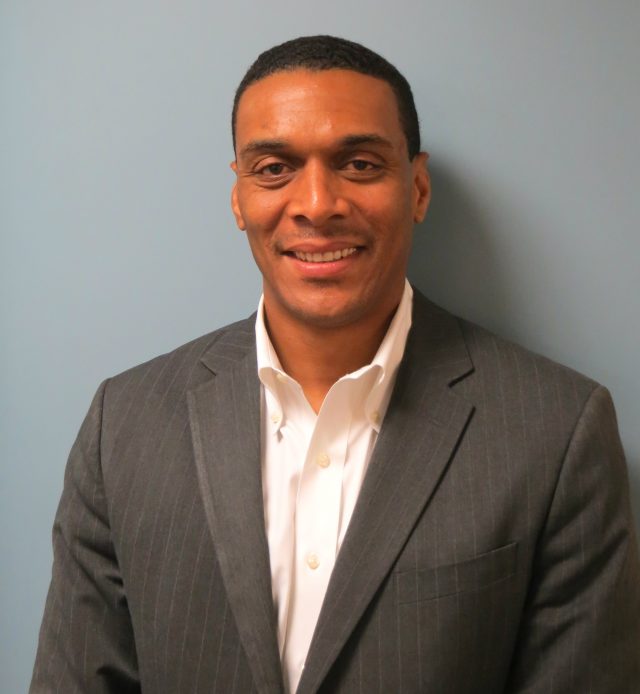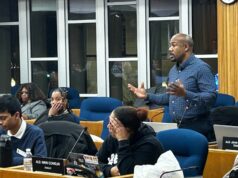
As the director of the Office of Special Populations for the National Institute on Aging, Dr. Carl Hill helps to facilitate studies focused on health disparities; supports the development of initiatives to enhance NIA’s research and training efforts targeting underrepresented groups, including minorities and women; and provides advice and guidance to senior staff on health research related to special populations.
“My role is to work with our staff – our dedicated program officials here at the NIA – to collaborate and stimulate some ideas that relate to diversity. Being sure that we have diverse researchers in our portfolio; researchers that represent various racial and ethnic groups, women researchers or researchers from smaller academic institutions.
“We also want to stimulate applications that explore health disparities research related to aging,” he continues. “So health disparity research prioritizes racial and ethnic populations of those who have endured circumstances of poverty, rural populations, and others. We want to be sure that we are understanding the life circumstances of a diverse group of individuals.”
Dr. Hill will be traveling to Madison to be the special guest speaker at the 9th Annual Solomon Carter Fuller Brain Health Brunch 2019, an annual event held each year to build awareness of Alzheimer’s disease in the African American Community. This year’s Brain Health Brunch, which will be held Saturday, March 16 at the Wyndham Garden Hotel, will include a free community brunch, wellness fair, performance by The “Amazing Grace” Chorus, caregiver education workshops, healthy food demonstration and memory screenings. This event is free and open to the public.
Dr. Hill became director of the Office of Special Populations back in October of 2013 where he leads the National Institute on Aging’s (NIA) efforts in stimulating health disparities research related to aging.
“There are 27 institutes at the center and we have a wide range of institutes that focus on child health and human development or heart, lung and blood research. Ours is dedicated to stimulating research and providing training and assuring the public around issues of aging and health,” Hill says. “It involves thinking critically about the health of older adults. As our people age into the category of 65 and older, thinking about their health needs and determinants that protect or jeopardize their health.”
This will be Hill’s second trip to Madison. In June of 2018, he delivered a special talk as the closing keynote event at the Collaborative Center for Health Equity’s 8th Annual Health Equity Leadership Institute. At the upcoming Solomon Carter Fuller Brain Health Brunch, sponsored by the Wisconsin Alzheimer’s Disease Research Center, Alzheimer’s & Dementia Alliance of Wisconsin and Wisconsin Geriatric Education Center, his keynote address will be titled “Double Jeopardy: The Curious Case of Health Disparities in the U.S.”
“I’m really interested in where health disparities research fits in this continuum of what I like to think is a real fight and struggle sometimes … a process to obtaining human dignity and human regard and representation in the United States,” he says. “I will like to spend some time talking about Dr. Solomon Carter Fuller, the first African-American psychiatrist in the United States and place his work in the context of some progress and some real champions for civil rights.”
Hill will, of course, be talking about how important health disparities research is.
“And how we’ve made advances and progress in civil rights and human regard,” Hill says. “The next frontier is to make sure that we are included in rigorous research as we race for the cure for conditions like Alzheimer’s disease and various cancers. We want to be sure that African Americans and other racial-ethnic minority groups and underrepresented groups are part of that process.”
“We have to continue to think critically about including diversity in our research,” he continues. “We really need to prioritize the process of recruiting and retaining African Americans, Latinos and Native Americans to our study samples. That’s very important. But then also I think it’s critical that those investigators think a little bit about different perspectives as they develop their research questions and hypothesis.
Hill gives the example of Alzheimer’s disease and the appropriate discussion around plaque build-up in the brain and the genetic contribution for those individuals who develop Alzheimer’s.
“There’s so much more to think of in terms of various perspectives for these racial-ethnic populations and these populations that endure poverty, the circumstance of having to build lives with limited resources, increased stress, unemployment, underemployment, residential segregation,” he says. “This is some really important work that is ongoing and will continue to be a priority is crafting the space for health disparity research related to aging, specifically Alzheimer’s disease, that accounts for social and behavioral conditions for those that are disproportionately affected by Alzheimer’s diseases like African Americans.”

Dr. Hill first started working in public health after graduating in the inaugural Master of Public Health program at Morehouse School of Medicine in Atlanta back in the early 90s. While he was attending a meeting of the American Public Health Association one of his mentors, Dr. Bill Jenkins, handed him an NMF pamphlet and encouraged him to apply for the doctoral fellowship.
Dr. Hill says that he considers Dr. Jenkins, who recently passed away on Feb. 17, was quite an inspiration in his life’s work. Jenkins devoted himself to eliminating health disparities and expanding opportunities for people of color to enter and succeed in careers in biostatistics and epidemiology.
“I was able to work very closely with him. He was a champion and a titan for health disparity research,” Hill says. “He was instrumental and one of the voices in getting the creation of the National Institute on Minority Health and Health Disparities.
“He really gave his life to mentoring researchers and stimulating health disparity research,” Hill adds. “ Working with him really gave me a burning desire to continue his work. I’m excited to be in Madison in honor of Dr. Solomon Carter Fuller, but I’m also dedicating this time to Dr. Bill Jenkins because he meant so much for my career and for many of us who are dedicated to this work.”
The 9th Annual Solomon Carter Fuller Brain Health Brunch 2019 will be held Saturday, March 16 at the Wyndham Garden Hotel, 2969 Cahill Main. Confidential memory screenings will be available for older adults from 1-3 p.m. in conjunction with the Solomon Carter Fuller Brain Health Brunch. For more information, click here.
































